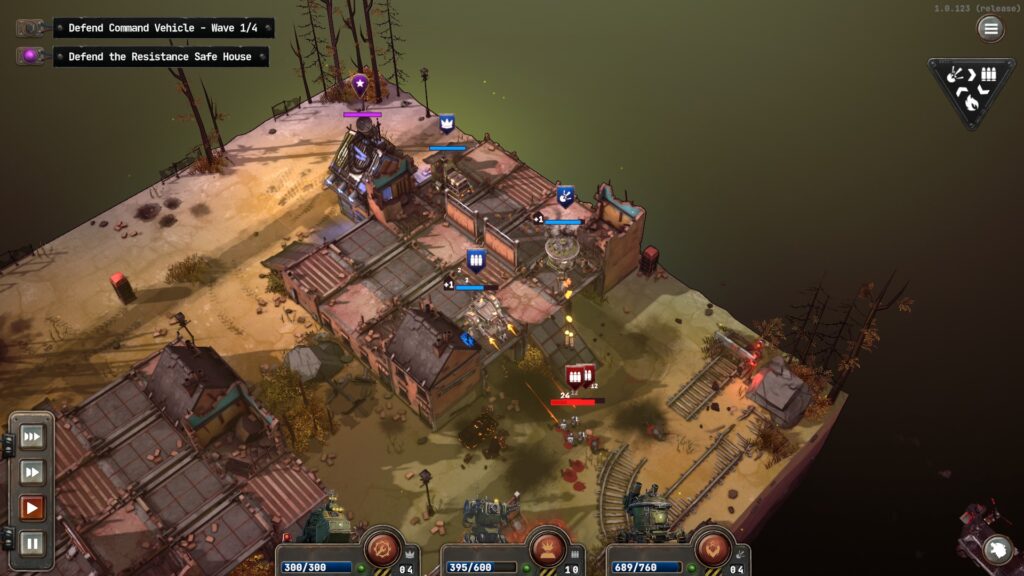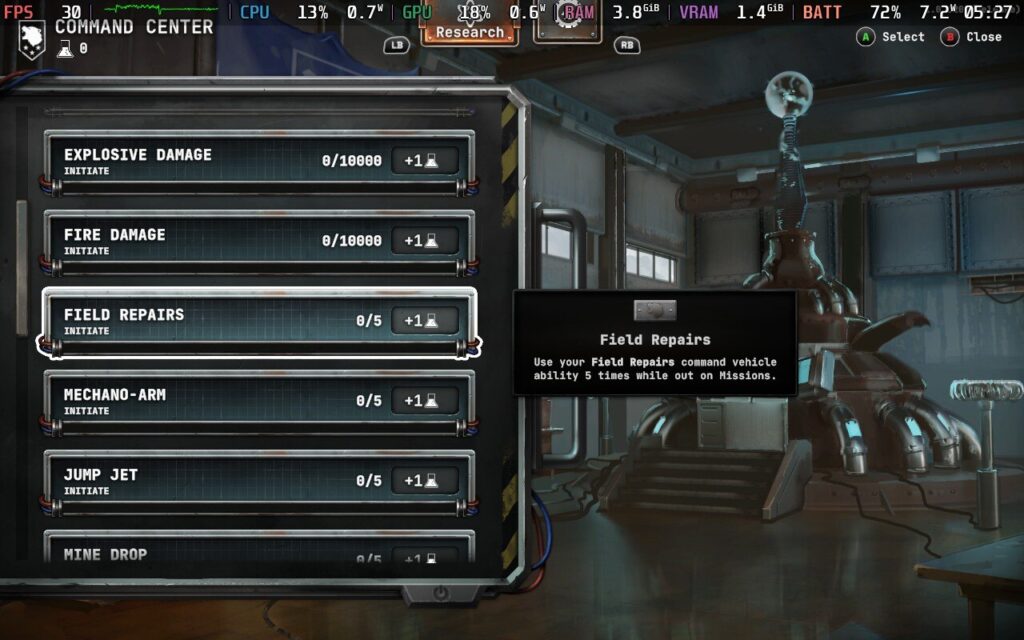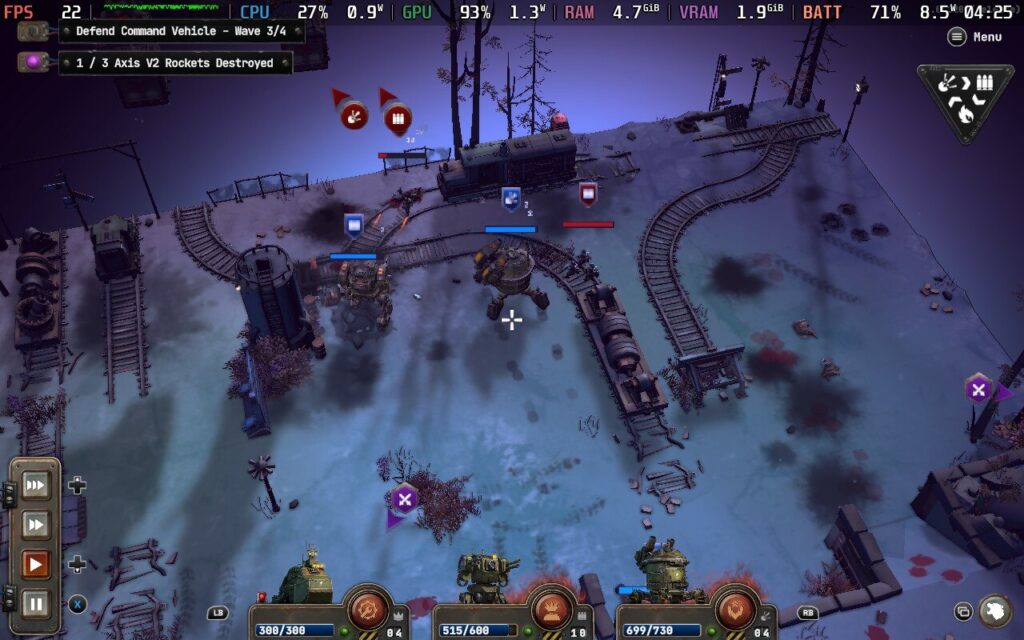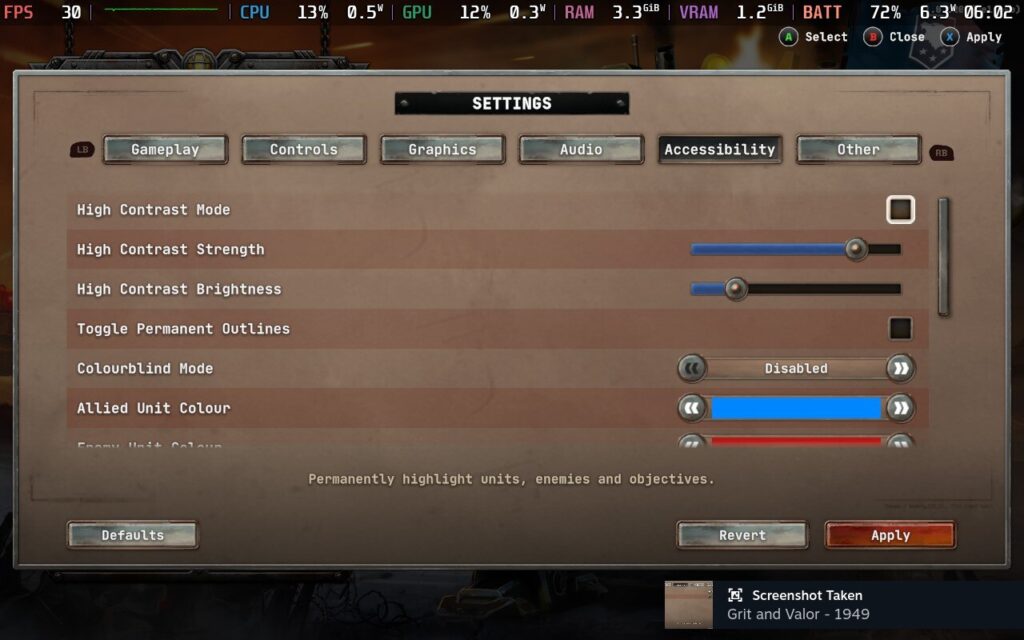8W - 10W

Grit and Valor - 1949 was provided by Megabit Publishing for review. Thank you!
Grit and Valor - 1949, a game I’ve eagerly anticipated, is now available! My time with the closed beta earlier this year was quite enjoyable, and this tactical roguelike by Milky Tea Studios is a compelling choice for fans of the genre. Despite issues like mech control, the game's engaging tactical gameplay makes it a worthwhile experience.

Grit and Valor 1949 is set in an alternate history of Europe after Nazi Germany pioneered powerful mechs to change the course of the war. Despite the Allies being able to salvage their mech technology in time, it was too late to stop the Axis powers, and they had overtaken all of Europe and Britain. With the allies on the brink of defeat, this is where you come in. Joining a small resistance, you must take back Europe from the Axis powers across a gigantic map, starting with the UK off the coast of Scotland.
It is not the most original plot, and I found the fightback concept a little nonsensical. However, some actions made sense, like how the Allies planned to smuggle an EMP into the heart of Axis territory to crush their technological edge over outright military dominance. The enemies are all cartoony evil, as one can expect from Nazis. Still, I will never complain about having more chances to blow them up. Regardless, I wish the enemies had more personality than mustache-twirling Voldemort clones.
The atmosphere is just as fantastic as in the beta, and the visual design is one of the game’s biggest strengths. While the maps are tiny, they are highly detailed and full of character. The battlefields vary depending on where you are, with a good range of terrains and chokepoints. Yet you don’t get much time to bask in the scenery, and the frantic combat will keep you on your toes. You have to use your units, abilities, and whatever terrain advantages you can get because this game is no pushover.
The gameplay is reminiscent of Into the Breach, with small fields and high stakes, but Grit and Valor favors real-time combat over the slower turn-based approach. You start with your command vehicle and a couple of mechs and must hold off waves of Nazi soldiers with your limited resources. If you lose your escort mechs or your commander's vehicle, you lose the run. The game is meant to be hard and replayed constantly, and the depth of the unlocks is extensive. This constant replayability ensures that the game never gets boring, as each run presents new challenges and opportunities for improvement.

A pause function was added for this full release, which is one of the improvements I loved. While I liked relying on my reflexes to position my units in response to the growing waves of Axis forces, having a pause option is a relief. The game is pretty stressful already, so I appreciate this change.
While the mission goals are usually simple, the game throws a few optional curveballs your way. Sometimes, there are enemy towers to destroy, or the Axis will bring in more powerful foes. The resistance will also support your units through airdrops with randomized upgrades. Health carries over between missions, and while you occasionally get the chance to do some repairs, these opportunities are few and far between.

The campaign map will be familiar to those who play Slay the Spire, with branching paths and events sprinkled between combat missions. Some allow you to hire another mech, while others can bring extra salvage opportunities from markets and underground operatives. As is the case in roguelikes, death is not the end. The resistance has a hub area you return to with permanent upgrades and facilities to develop. I won’t be the only one surprised at Grit and Valor’s depth, and there’s enough content to keep players invested.
While some things have improved since I played the beta, some problems with control hamper the experience. Ordering your units around feels slippery. It is easy to misclick and order the wrong unit to a different location. To make matters worse, you cannot change a unit action until it has completed the last one. I lost a couple of runs through these accidental commands, then watched with horror as my command unit trundled into an upcoming wave of Nazi mechs and got blown up.
While this is a major issue, it does not make Grit and Valor a bad game. The gameplay and atmosphere are excellent, with enough depth to keep roguelike fans invested. The game's technical performance, while stable for the most part, could use some improvement. However, these issues do not detract significantly from the overall experience, and as long as Milky Tea Studios fixes the control gremlins, tactical game fans are in safe hands.
Grit and Valor - 1949 is rated as Verified by Valve, and despite the control problems I mentioned, this is a solid overall experience on the Steam Deck.
Full controller support is available out of the box. Despite the current issues, you can easily navigate all the essential controls. Grit and Valor lack custom graphical options and the ability to change controller key binds. Hence, it is fortunate that the game plays reasonably well. Unfortunately, the game cannot hit 90FPS on the Steam Deck OLED even with a full TDP, but it’s easy to lock the frames to 60FPS and go from there. At 60FPS on stock settings, Grit and Valor play smoothly and look good.
The only settings you can tweak in graphics options are screen resolution and a simple texture preset between Low, Medium, and High. There’s no way to know what these presets change because the game does not tell you. Still, I found Medium settings to be the best balance between visual quality and performance. High saw very little in the way of visuals from what I saw and bumped up the power drain significantly, so for my recommended settings, Medium is the way to go.

While the game is a smooth experience, the stock TDP preset will cause a high power drain, especially during combat sections. A lot happens on screen, with waves of Axis soldiers bearing down upon your outnumbered resistance and all the death and fire effects. Without tinkering with TDP, you’ll see an average power draw of 15 watts. While this is pretty high, you will still see around three and a half hours of battery life on the Steam Deck OLED.
Grit and Valor - 1949 scales reasonably well with a low TDP, and I was pleasantly surprised at how much battery life it can squeeze out of it. If you are like me and want to get as much juice out of the Steam Deck as possible, you can work wonders with our limited tools.

I found that a 30FPS/60hz lock, low graphics preset, and a 4-watt TDP saw the best results, finding that perfect balance between battery life and performance without sacrificing too much on visuals. The graphics are a little blurrier on Low settings, but the game still looks decent. I saw a couple of dips in framerate during some combat animations, but otherwise, the performance is decent.
Of course, the main draw of this setting is the battery life gains. The average power draw dropped significantly to around 9 watts, even during combat scenes. I frequently saw it drop below that. That is an impressive gain of over 90 minutes on the OLED Steam Deck.
Grit and Valor - 1949 is available in English, French, Italian, German, Spanish - Spain, Japanese, Portuguese, Simplified Chinese, Traditional Chinese, Polish, Russian, Korean, and Ukrainian.

Grit and Valor - 1949 has many accessibility features. There is a colorblind mode, a high contrast mode with strength and brightness sliders, and the ability to customize allied and enemy unit colors.
You can also change v-sync, display subtitles, invert camera rotation, adjust the camera sensitivity, toggle helpful tooltips, and auto-skip loading screens. The only accessibility issue is the lack of gamepad customization; otherwise, this is an impressive showing.
Grit and Valor - 1949 is an interesting tactics roguelike that packs much more depth than it seems on the surface. The alternate history setting, while nothing new, is interesting enough with the cool mechs you get to wield in combat, and the standard gameplay loop is solid. It looks great with a solid sound design, which is another thing in its favor.
However, some things need a lot of improvement. The odd control issues make things much more frustrating than they should be. It should be a simple enough fix, although the cartoon evil of the Axis in the campaign is not. The latter problem is my nitpick over genuine gripes with the controls. Overall, Grit and Valor - 1949 needs some fine-tuning, but the tactical gameplay with a staggering amount of content is on point. For its base 20$ price tag, you are getting a lot of bang for your buck.
Our review is based on the PC version of this game.
If you enjoyed this review, be sure to check out the rest of the content on SteamDeckHQ! We have a wide variety of game reviews and news that are sure to help your gaming experience. Whether you're looking for news, tips and tutorials, game settings and reviews, or just want to stay up-to-date on the latest trends, we've got your back.
Grit and Valor 1949 blends solid mech roguelike combat with deep strategy mechanics, although controls need work. It is also solid on the Steam Deck.
Limit
30
Refresh Rate
60
HRS
NO
TDP Limit
4
Scaling Filter
Linear
GPU Clock
Disabled
No Forced Compatbility
Low Preset
8W - 10W
53c - 57c
~5 Hours